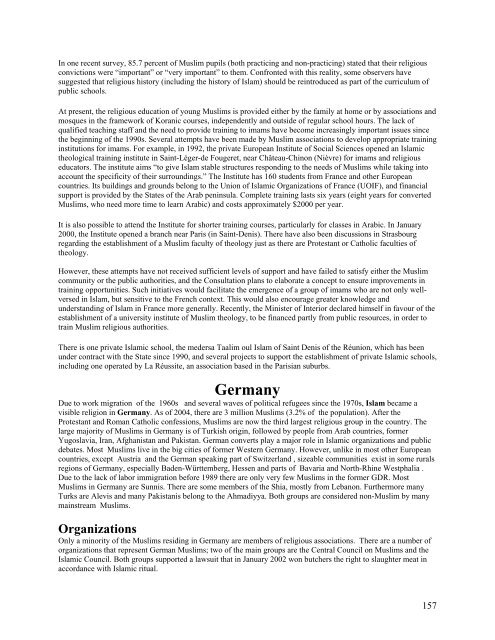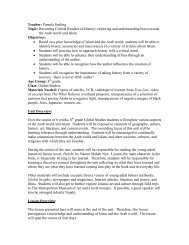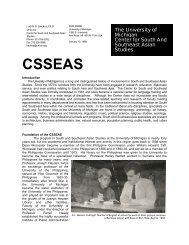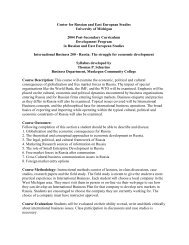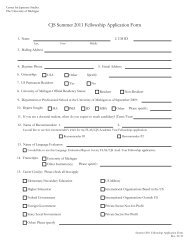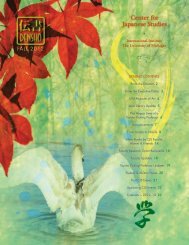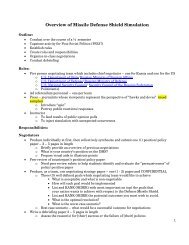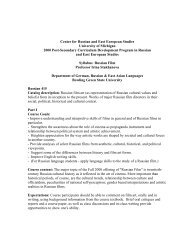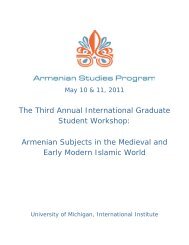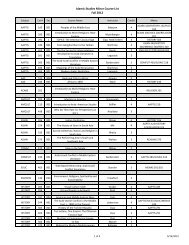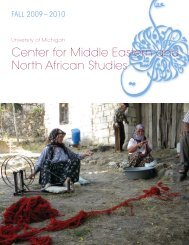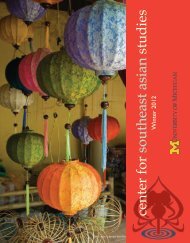Muslims in Europe: - International Institute - University of Michigan
Muslims in Europe: - International Institute - University of Michigan
Muslims in Europe: - International Institute - University of Michigan
Create successful ePaper yourself
Turn your PDF publications into a flip-book with our unique Google optimized e-Paper software.
In one recent survey, 85.7 percent <strong>of</strong> Muslim pupils (both practic<strong>in</strong>g and non-practic<strong>in</strong>g) stated that their religious<br />
convictions were “important” or “very important” to them. Confronted with this reality, some observers have<br />
suggested that religious history (<strong>in</strong>clud<strong>in</strong>g the history <strong>of</strong> Islam) should be re<strong>in</strong>troduced as part <strong>of</strong> the curriculum <strong>of</strong><br />
public schools.<br />
At present, the religious education <strong>of</strong> young <strong>Muslims</strong> is provided either by the family at home or by associations and<br />
mosques <strong>in</strong> the framework <strong>of</strong> Koranic courses, <strong>in</strong>dependently and outside <strong>of</strong> regular school hours. The lack <strong>of</strong><br />
qualified teach<strong>in</strong>g staff and the need to provide tra<strong>in</strong><strong>in</strong>g to imams have become <strong>in</strong>creas<strong>in</strong>gly important issues s<strong>in</strong>ce<br />
the beg<strong>in</strong>n<strong>in</strong>g <strong>of</strong> the 1990s. Several attempts have been made by Muslim associations to develop appropriate tra<strong>in</strong><strong>in</strong>g<br />
<strong>in</strong>stitutions for imams. For example, <strong>in</strong> 1992, the private <strong>Europe</strong>an <strong>Institute</strong> <strong>of</strong> Social Sciences opened an Islamic<br />
theological tra<strong>in</strong><strong>in</strong>g <strong>in</strong>stitute <strong>in</strong> Sa<strong>in</strong>t-Léger-de Fougeret, near Château-Ch<strong>in</strong>on (Nièvre) for imams and religious<br />
educators. The <strong>in</strong>stitute aims “to give Islam stable structures respond<strong>in</strong>g to the needs <strong>of</strong> <strong>Muslims</strong> while tak<strong>in</strong>g <strong>in</strong>to<br />
account the specificity <strong>of</strong> their surround<strong>in</strong>gs.” The <strong>Institute</strong> has 160 students from France and other <strong>Europe</strong>an<br />
countries. Its build<strong>in</strong>gs and grounds belong to the Union <strong>of</strong> Islamic Organizations <strong>of</strong> France (UOIF), and f<strong>in</strong>ancial<br />
support is provided by the States <strong>of</strong> the Arab pen<strong>in</strong>sula. Complete tra<strong>in</strong><strong>in</strong>g lasts six years (eight years for converted<br />
<strong>Muslims</strong>, who need more time to learn Arabic) and costs approximately $2000 per year.<br />
It is also possible to attend the <strong>Institute</strong> for shorter tra<strong>in</strong><strong>in</strong>g courses, particularly for classes <strong>in</strong> Arabic. In January<br />
2000, the <strong>Institute</strong> opened a branch near Paris (<strong>in</strong> Sa<strong>in</strong>t-Denis). There have also been discussions <strong>in</strong> Strasbourg<br />
regard<strong>in</strong>g the establishment <strong>of</strong> a Muslim faculty <strong>of</strong> theology just as there are Protestant or Catholic faculties <strong>of</strong><br />
theology.<br />
However, these attempts have not received sufficient levels <strong>of</strong> support and have failed to satisfy either the Muslim<br />
community or the public authorities, and the Consultation plans to elaborate a concept to ensure improvements <strong>in</strong><br />
tra<strong>in</strong><strong>in</strong>g opportunities. Such <strong>in</strong>itiatives would facilitate the emergence <strong>of</strong> a group <strong>of</strong> imams who are not only wellversed<br />
<strong>in</strong> Islam, but sensitive to the French context. This would also encourage greater knowledge and<br />
understand<strong>in</strong>g <strong>of</strong> Islam <strong>in</strong> France more generally. Recently, the M<strong>in</strong>ister <strong>of</strong> Interior declared himself <strong>in</strong> favour <strong>of</strong> the<br />
establishment <strong>of</strong> a university <strong>in</strong>stitute <strong>of</strong> Muslim theology, to be f<strong>in</strong>anced partly from public resources, <strong>in</strong> order to<br />
tra<strong>in</strong> Muslim religious authorities.<br />
There is one private Islamic school, the medersa Taalim oul Islam <strong>of</strong> Sa<strong>in</strong>t Denis <strong>of</strong> the Réunion, which has been<br />
under contract with the State s<strong>in</strong>ce 1990, and several projects to support the establishment <strong>of</strong> private Islamic schools,<br />
<strong>in</strong>clud<strong>in</strong>g one operated by La Réussite, an association based <strong>in</strong> the Parisian suburbs.<br />
Germany<br />
Due to work migration <strong>of</strong> the 1960s and several waves <strong>of</strong> political refugees s<strong>in</strong>ce the 1970s, Islam became a<br />
visible religion <strong>in</strong> Germany. As <strong>of</strong> 2004, there are 3 million <strong>Muslims</strong> (3.2% <strong>of</strong> the population). After the<br />
Protestant and Roman Catholic confessions, <strong>Muslims</strong> are now the third largest religious group <strong>in</strong> the country. The<br />
large majority <strong>of</strong> <strong>Muslims</strong> <strong>in</strong> Germany is <strong>of</strong> Turkish orig<strong>in</strong>, followed by people from Arab countries, former<br />
Yugoslavia, Iran, Afghanistan and Pakistan. German converts play a major role <strong>in</strong> Islamic organizations and public<br />
debates. Most <strong>Muslims</strong> live <strong>in</strong> the big cities <strong>of</strong> former Western Germany. However, unlike <strong>in</strong> most other <strong>Europe</strong>an<br />
countries, except Austria and the German speak<strong>in</strong>g part <strong>of</strong> Switzerland , sizeable communities exist <strong>in</strong> some rurals<br />
regions <strong>of</strong> Germany, especially Baden-Württemberg, Hessen and parts <strong>of</strong> Bavaria and North-Rh<strong>in</strong>e Westphalia .<br />
Due to the lack <strong>of</strong> labor immigration before 1989 there are only very few <strong>Muslims</strong> <strong>in</strong> the former GDR. Most<br />
<strong>Muslims</strong> <strong>in</strong> Germany are Sunnis. There are some members <strong>of</strong> the Shia, mostly from Lebanon. Furthermore many<br />
Turks are Alevis and many Pakistanis belong to the Ahmadiyya. Both groups are considered non-Muslim by many<br />
ma<strong>in</strong>stream <strong>Muslims</strong>.<br />
Organizations<br />
Only a m<strong>in</strong>ority <strong>of</strong> the <strong>Muslims</strong> resid<strong>in</strong>g <strong>in</strong> Germany are members <strong>of</strong> religious associations. There are a number <strong>of</strong><br />
organizations that represent German <strong>Muslims</strong>; two <strong>of</strong> the ma<strong>in</strong> groups are the Central Council on <strong>Muslims</strong> and the<br />
Islamic Council. Both groups supported a lawsuit that <strong>in</strong> January 2002 won butchers the right to slaughter meat <strong>in</strong><br />
accordance with Islamic ritual.<br />
157


